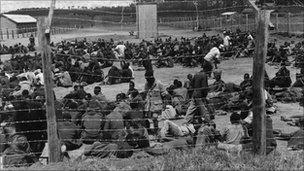Mau Mau torture files were 'guilty secret'
- Published

Rounded up: Mau Mau suspects in camps
Documents revealing the torture of Mau Mau Kenyans directed by the British authorities were a "sort of guilty secret," a report says.
Foreign Secretary William Hague said the papers should now be made public.
The internal review found some Foreign Office officials had chosen to ignore the documents' existence.
It comes as the High Court is due to rule on a compensation case brought by four Kenyans over alleged human rights abuses in the 1950s and 1960s.
The documents give further details of what ministers in London knew about how the colony was attempting to crush the rebellion that paved the way to independence.
Many of them, which were released by the High Court last month, were only recently found in the Foreign Office's own archives after years of investigations by academics.
The papers were brought to the UK when Kenya became independent but, unlike others, were never made public in the National Archives. Until recently, they were in boxes kept at the Hanslope Park archives near Milton Keynes.
In a written statement released last Thursday, Mr Hague said it was time to make the files public through the National Archives, "subject only to legal exemptions".
'Too difficult'
Former British High Commissioner to Canada Anthony Cary, who conducted the review, found there was confusion about the status of the files, but this only explained the failure up to a point.
But he said that while some officials realised their importance, they chose to "ignore" their existence following three Freedom of Information requests from the Kenyans' lawyers in 2005 and 2006.
Mr Cary said: "It was perhaps convenient to accept the assurances of predecessors that the migrated archives were administrative and/or ephemeral, and did not need to be consulted for the purposes of FOI requests, while also being conscious of the files as a sort of guilty secret, of uncertain status and in the "too difficult" tray."
Adding that officials at the Foreign Office need urgently to review all its documents, he said: "The migrated archives saga reminds us that we cannot turn a blind eye to any of our holdings.
"All information held by the FCO should have been retained by choice rather than inertia, and must be effectively managed from a risk perspective."
'Appalling conditions'
Four Kenyans - three men and one woman aged in their 70s and 80s - are the lead claimants in the reparations case.
They want the UK government to acknowledge responsibility for atrocities committed by local guards in camps administered by the British in the pre-independence era.
The UK says the claim is not valid because of the amount of time since the abuses were alleged to have happened, and that any liability rested with the Kenyan authorities after independence in 1963.
Daniel Leader, counsel for their lawyers Leigh Day, said the report was significant because if the High Court ruled the British government was liable, it could not legitimately claim there was a time lag because it withheld crucial documents needed by his team.
Historians say the Mau Mau movement helped Kenya achieve independence. But their actions have also been blamed for crimes against white farmers and bloody clashes with British forces throughout the 1950s.
Veterans say they suffered barbaric treatment, including torture, as the British suppressed the rebellion.
The Kenya Human Rights Commission has said 90,000 Kenyans were executed, tortured or maimed during the crackdown, and 160,000 were detained in appalling conditions.
- Published7 April 2011
- Published7 April 2011
- Published6 April 2011